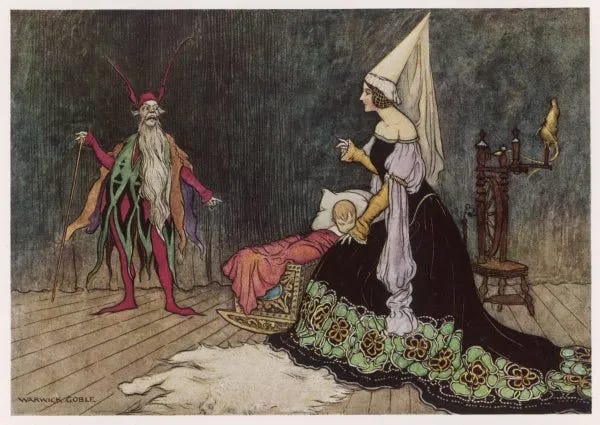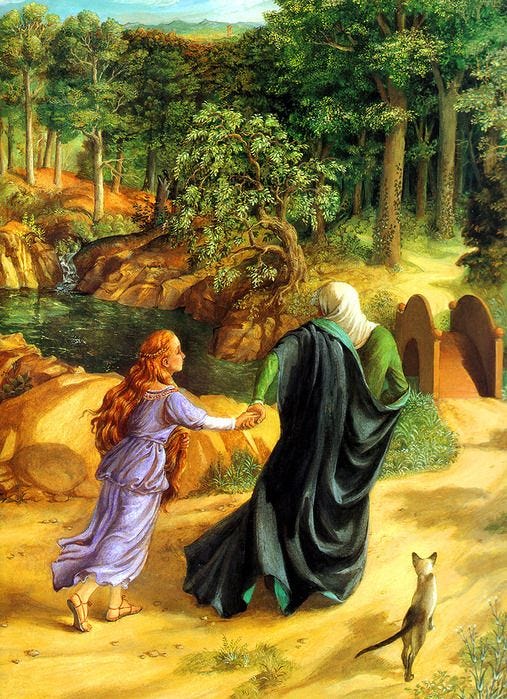I read to Moses while he gets his hair cut at my office (an unusual and wonderful perk of working where I do).
This week, I read to him from a collection of old fairy tales from around the world. These are the old-fashioned translations, with lots of death, torture, and dark motives; nothing Disneyfied in these pages. They read as rather inappropriate for sheltered modern children.
At Moses’s request, we started with Rapunzel and then moved on to Rumpelstiltskin, and then a Punjabi fable that I didn’t know, called The Snake Prince.
I was struck by a common thread in these three stories, each coming from different corners of the world. They all include a central character with a deep desire for a baby.
A strange little man, a powerful witch, and a king are all desperate for a child, and their desire sets everything in the story in motion.
I kept thinking about how strange this desire seems to us now, in 2025, plunging into an era of childlessness. We don’t see children as an undeniable cultural good anymore. Instead, it’s wealth: European vacations and Teslae and Instagrammable sneakers.
The stories we tell are different, too. Our modern fairy tales are all about superheroes: Individual strong men who save the world through their brains and brawn. Women and children are absent from the stories America loves. If they do show up in a Marvel movie, they’re a decorative accessory or an emotional plot point on the way to some super-cool violence.
The desire for wealth and unchecked agency appear in old fairy tales and ancient myths, too, of course. But they almost always accompany a serious downfall. Greed, avarice, and aggression lead to ruination—not to paradise.
I’ve gone on about this before, but this cultural shift—away from children, toward individual fulfillment—keeps nagging at me.
Culturally, why have we lost the desire for children?
I don’t know if it’s any of these factors or if it’s all of them, but the following seem like related causes.
What’s changed since the Brothers Grimm?
Wealth and its globalization. Compared to every past generation, we have so much disposable income, even though we may not feel it personally.
Overwhelming individualism, especially in the West. “Children would get in the way of me having a good time” is a common refrain.
Crumbling institutions. Whether it’s governments or churches or other “third places,” we don’t belong anywhere anymore.
Extended lifespan. We’re living a very long time. This changes our goals.
Dispersed and/or fragmented family networks. If you have no grandmothers nearby, everything gets way harder (take it from me).
Lack of trust in authority, even/including old people. We have no respect for the aged or anyone who may be in a position to give us guidance.
Emancipation of women. Whether through birth control or higher education or career advancement, women have way more agency than they ever have had previously.
Widespread fear and anxiety, whether it’s climate change or politics or the economy. We have too much information, and it’s killing us.
Some of these seem like quantifiably bad things. Some of these seem like good things: I like that I get to wear jeans and vote and go to college. I like that people are living much longer. I like that we’re not being killed by random infections and accidents.
But we seem to have traded the desire for and joy of children for many of these comforts. Children are not easy or comfortable. They definitely get in the way of having a “good time,” as young people define it. We tend to see them as sticky nuisances instead of what they might actually be: an eternal joy, a legacy, an unfolding new life.
Our imaginations are shallow
At the core, I think this is a failure of the imagination.
We’re unable to dream of a life in which children could be fulfilling, could be joyful, could be more meaningful than chasing money. We have a hard time conjuring such a life. I know I did, back when I was young and waffling about whether I even wanted kids at all. I couldn’t imagine what that life would look like. It didn’t sound very desirable. No one spoke to me about it, except in hushed tones of warning.
The worship of self and wealth has warped our desires. We can only think about ourselves. We can only chase the fleeting state of personal happiness, which remains perpetually just beyond our reach.
The idea that suffering and hardship and work might be good for us is anathema. We’re so comfortable, with our Netflix and our immaculate phones and tricked-out kitchens. Kids would make us uncomfortable. Kids would require sacrifice. Kids would demand our labor and our hearts. It all just sounds like too much to give.
I am eager to interrupt these tendencies in myself. Even though I made three children, I am still tempted by the cultural narrative to view them as burdens instead of as gifts.
And so I want to keep reading to my kids from these old myths. I want them to hear how precious and desirable children are. And I especially want them to know what a joy they are to me: how deeply I desire them. How they have changed everything.
We need to tell each other different stories. And I think they might be the old stories.
An invasive tree grows in Charlottesville
Several years ago, it was a weed that we didn’t address, and now it is a full-grown white mulberry tree (I think).
The tree grows up along our fence, the rails of which it is beginning to displace, but it has become a rather beautiful shade for our family room, filtering light in the most lovely, sprightly way in the spring.
I first regarded the tree as an interloper. We talked about cutting it down, planting something else more pleasing in its stead. But soon, due to its service and fast-growing ascent, it became a welcome companion.
Then, potential tragedy: A few weeks ago, we had a sudden frost. The young leaves of the mulberry have blackened and shriveled. The whole tree looks sick.
I worry that this tree, which I once looked on with disdain, will die. It has become precious to me, and I think that perhaps it would have been safer if I had greeted it more hospitably from the beginning. Perhaps then it would not have reacted so dramatically to the frost. Perhaps then it should not be in danger of death. Perhaps I have killed it with my initial disregard.
The less-needed future self play-acts at being Virginia Woolf
Sometimes I daydream about a time, years in the future, when I am no longer as necessary.
I have clothes I am saving for this imagined future time. They furnish my daydreams. There’s an expensive, beautiful English dressing gown, with impractical kimono sleeves, that hangs in my closet. I touch it sometimes and daydream about wearing it and waking up early and drinking tea and reading, and no one needs me to make their breakfast or pack their lunch or wipe their bottom, and I can read for an hour if I like, in my impractical dressing gown.
It’s a possibility. And yet I know that when this time comes, I will look back at where I am now with wistfulness and yearning. Wasn’t it nice, back then, to be so tired and so needed? I will think, folding my hands into the sleeves and looking out into the yard over my cup of tea.
Currently reading
Why We Sleep, Matthew Walker
Sister Europe, Nell Zink
Real Estate, Deborah Levy






Thanks for writing this, Abby!
I recently read the little book "On Getting Out of Bed" by Alan Noble (written to encourage people with depression or anxiety) and then read the recent NYTimes series on Embryos, and personally am walking through a season of infertility ... all these plus your post has driven home to me the idea that human life in and of itself is Good - not human life that is healthy, or has a high IQ, or is beautiful or without depression - but all human life.
In the hyper-rationalism / post-Enlightenment of today, it feels strange to say that every time a life is created we witness a miracle - but the fact is that, though we can take steps to create life, we do not create it ourselves; we can only receive it and we have to recognize it as miraculous. That recognition brings a beautiful sanctity to every child's life. I wonder if when many of these fairy tales were first written there was a higher value placed on the holy mystery of creating life. Wondering all of these things alongside you!
I had similar thoughts this past winter when I read aloud The Christmas Carol by Dickens, unabridged, to my kids. Children are shown as so valuable and delightful, a treasure through life. Such a stark contrast with the modern view.